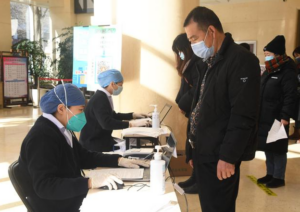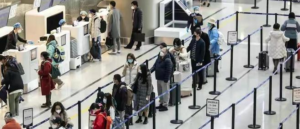
A charity relay race to witness the epidemic from peak to trough
According to the briefing before the Spring Festival of the joint prevention and control mechanism of the State Council, China has smoothly passed the peak of infection and serious illness of the current round of the epidemic, but a small program that accompanies many people seeking medicine through difficult times is still running silently.
From antipyretics, antigens, thermometers to oximeters, from first-tier cities to second- and third-tier cities, and even villages, it connects millions of people with their medicine needs, and this public welfare mutual aid relay race has witnessed the epidemic slide from peak to trough.
Most of the Tencent travel service team that developed this small program are young people in the post-90s. The team’s product manager Du Shaobo said that the greatest value the Internet brings to public welfare is that it allows information to be connected together more quickly and efficiently.

Zheng Dongyang, head of Tencent’s travel service team, works overtime to promote the product launch update in December 2022.
In the early morning of December 17, 2022, Zheng Dongyang, head of Tencent’s travel service team, observed the demand for large-scale medication in society and proposed the idea of developing a small program for medication demand matching. Zheng Dongyang also noticed that a large number of users in many places were seeking medicine on social platforms, and some places even used “emergency release” to call on residents to help each other.
The team used its past experience of quickly launching products in public emergencies to launch the first version of the app within 48 hours, connecting “I need medicine” and “I have more medicine” in similar locations.
“The trust of neighbors must be greater than strangers in social platforms.” Zheng Dongyang said.
Shortly after the program went live, the background received a message from an external helper, whose location was shown in a hotel in Nanjing, describing himself as “coughing with phlegm for three days and completely unable to buy medicine.
Du Shaobo said, “I was anxious for him and hoped someone could help him.”
At almost the same moment, the first help message appeared, located in Beijing’s Haidian District, with just a few words: “Sensecon 6 capsules”.
“I could really feel the power of those few words.” Du Shaobo said, “One Nanjing, one Beijing, these two locations are more than 1,000 kilometers apart, but at that moment, I realized that a relay race of public welfare mutual help had begun.”
Just half a day after the app went live, usage exceeded 100,000, and in the days that followed, users posted millions of requests for help and help information on the platform. The sudden burst of traffic far exceeded expectations and posed challenges to the team’s manpower, technology and server resources.
Many people took the initiative to forward the platform in their circle of friends, and some media outlets also opened a special section for “surplus medicine sharing” and accessed the small program. Some regional authorities also wanted the team to provide information about the amount of local help and the demand for medicines, so that they could make the next deployment of resources more efficiently.
The small program is constantly updated and iterated. The team has been trying to find a balance between how to guarantee the safety and privacy of users while allowing for efficient information matching.
In the applet, the address only shows the approximate distance, such as less than 500 meters, less than 100 meters, a street, a neighborhood, and will not show specific information. At the same time some labeling of mutual aid information, such as whether the crowd is the elderly, children, pregnant women, the priority of symptoms, to improve the efficiency of the search for information as much as possible.
“Safety and efficiency are very difficult to balance.” Zheng Dongyang said the first version did not use the real name system, but as an emergency medicine, it is important to give users a sense of trust. In the process of actual promotion and application, the team found that different users feel different degrees of “security”, so they successively put online virtual numbers, limit the number of times to view contact information and other features to optimize.
In the drug information filling, according to the National Health Commission’s recommendation of the home often over-the-counter drugs, the form of drugs fixed, the user can only choose “ibuprofen 4” “antigen 2” – this is also based on the positive patients. -This is also based on the number of drugs commonly required by positive patients. By limiting the number of drugs to small doses, it is possible to avoid the “drug dealer” community to a certain extent and to discourage those who want to hoard drugs.
The earliest small program only includes the National Health Commission’s recommendation of commonly available over-the-counter drugs, but also has its own special considerations. Zheng Dongyang said that if other commercial brands of antipyretic drugs are added, it may raise questions about the diversion of brands. If you don’t add them, you can’t satisfy some users who happen to have trust in these drugs. So, after processing, the vast majority of demand in the app is reserved for standardized health commission-recommended standby drugs, and a few users are set to note over-the-counter drugs in “other” brackets.
Many users also contributed “good ideas” in the process of using it. One user suggested that many people might forget to click on the “resolved” option after completing a support session, which would raise the screening threshold and cause repeated interruptions for other users. The team thought this was a good idea, so they presented the number of times the contact information was viewed, the more times it was viewed, the higher the probability of getting help, so that other more urgent needs would be seen first.
Generally speaking, a user’s home stock of drugs to help 10 neighbors is the limit of the situation, for security reasons, more than 10, the platform does not allow to continue to operate, if you encounter special circumstances, you can feedback to the platform through the complaint portal. In the feedback, the team found that the number of “over the limit” behind the volunteers using this tool to deliver love, the team opened a special permission for it, so that professional caring people can help more people.

The Tencent Travel Service team works in the office in December 2022.
“People say it’s a public service, but in fact it’s also addressing the needs of users.” Zheng Dongyang said, “In fact, we all hope that this product will go offline as soon as possible, which means the peak has passed and the problem is solved. But our capacity will not go offline.”


Average Rating